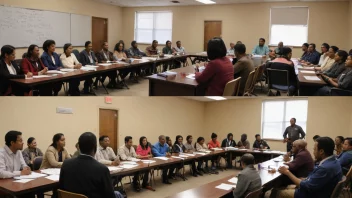In recent years, mental health awareness has gained significant traction, with various sectors of society recognizing the importance of addressing mental health issues. Among these sectors, religious groups have emerged as vital players in promoting mental health awareness and providing support to those in need. This article explores the multifaceted contributions of religious organizations to mental health awareness, examining their roles in community support, education, advocacy, and the integration of spiritual care into mental health services.
Understanding the Role of Religion in Mental Health
Religion and spirituality have long been associated with mental health, influencing how individuals perceive and cope with mental health challenges. Many people turn to their faith during times of distress, seeking solace, guidance, and support. This reliance on spiritual beliefs can play a crucial role in mental well-being, offering a framework for understanding suffering and promoting hope.
Spirituality and Mental Health
Research has shown that spirituality can positively affect mental health, providing individuals with a sense of purpose, community, and resilience. Religious beliefs often encourage practices such as prayer, meditation, and communal worship, which can reduce feelings of isolation and anxiety. The sense of belonging fostered by religious groups can be particularly beneficial for those struggling with mental health issues.
Community Support Initiatives
One of the most significant contributions of religious groups to mental health awareness is their ability to establish community support initiatives. Many faith-based organizations offer programs that provide emotional and spiritual support to individuals facing mental health challenges.
Support Groups
Support groups facilitated by religious organizations create safe spaces for individuals to share their experiences and struggles. These groups often focus on specific issues, such as depression, anxiety, or addiction, and provide a platform for individuals to connect with others who understand their challenges. The shared experiences within these groups can foster healing and a sense of community.
Counseling Services
Many religious organizations offer counseling services that integrate spiritual guidance with mental health support. Trained counselors, often with a background in both psychology and theology, can provide holistic care that addresses both mental and spiritual needs. This approach acknowledges the interconnectedness of mental and spiritual health, allowing individuals to explore their challenges within a faith-based context.
Education and Awareness Campaigns
Religious groups are also instrumental in raising awareness about mental health issues through education and outreach programs. By addressing the stigma surrounding mental illness, these organizations can foster a culture of understanding and acceptance.
Workshops and Seminars
Many faith communities host workshops and seminars focused on mental health education. These events can cover a variety of topics, including the signs and symptoms of mental illness, coping strategies, and the importance of seeking help. By educating their congregations about mental health, religious leaders can empower individuals to take proactive steps towards their well-being.
Public Awareness Campaigns
Religious organizations often participate in public awareness campaigns that highlight mental health issues and promote resources available for those in need. By leveraging their platforms, these groups can reach a wide audience, encouraging dialogue and reducing stigma associated with mental illness.
Advocacy for Mental Health Policy
Beyond community support and education, religious groups have a role in advocating for mental health policy changes. By leveraging their influence, they can push for systemic changes that improve access to mental health care and support services.
Lobbying for Policy Change
Many religious organizations engage in lobbying efforts to promote mental health initiatives at local, national, and international levels. They may work alongside mental health professionals and advocacy groups to push for policies that prioritize mental health funding, accessibility, and integration within healthcare systems.
Partnerships with Mental Health Organizations
Collaborations between religious groups and mental health organizations can amplify efforts to address mental health challenges. These partnerships can lead to the development of comprehensive programs that combine spiritual support with evidence-based mental health practices.
Integrating Spiritual Care into Mental Health Services
As mental health services evolve, there is a growing recognition of the importance of integrating spiritual care into treatment plans. Religious groups can play a pivotal role in this integration.
Training Mental Health Professionals
Religious organizations can contribute to training programs for mental health professionals, emphasizing the significance of understanding spirituality in the context of mental health care. This training can help professionals recognize the spiritual needs of their clients and incorporate these aspects into their treatment approaches.
Collaborative Care Models
Collaborative care models that include spiritual care providers alongside mental health professionals can enhance patient outcomes. By fostering interdisciplinary collaboration, religious groups can ensure that individuals receive holistic care that addresses both mental and spiritual needs.
Challenges and Opportunities
While religious groups have made significant strides in promoting mental health awareness, they also face challenges that must be addressed to maximize their impact.
Addressing Stigma Within Religious Communities
Despite progress, stigma surrounding mental health issues persists within some religious communities. Addressing this stigma is crucial to encouraging individuals to seek help and support. Religious leaders can play a key role in shifting attitudes and promoting understanding within their congregations.
Resource Limitations
Many religious organizations operate with limited resources, which can hinder their ability to provide comprehensive mental health services. Building partnerships with mental health organizations and seeking grants or funding opportunities can help expand their reach and impact.
Conclusion
Religious groups have made significant contributions to mental health awareness through community support initiatives, education, advocacy, and the integration of spiritual care into mental health services. By leveraging their influence and resources, these organizations can play a crucial role in addressing mental health challenges and promoting overall well-being. As society continues to evolve in its understanding of mental health, the collaboration between religious groups and mental health professionals will be essential in fostering a culture of acceptance, support, and healing.






